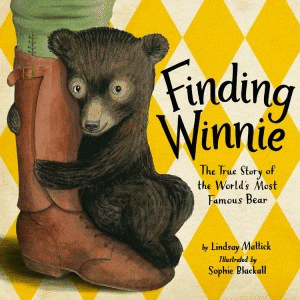
Finding Winnie: The True Story of the World’s Most Famous Bear
Finding Winnie: The True Story of the World’s Most Famous Bear
Lindsay Mattick
Sophie Blackall
Little Brown, 2015
56pp., hbk
9780316324908
Cole asks his mother for a bedtime story – a true one about a bear. And it just so happens that Lindsay Mattick is the great-great-granddaughter of Harry Colebourn, a Canadian vet who, in 1914, was conscripted to join the war effort to look after the soldiers’ horses. On his way to the training ground far from his native Winnipeg, the train pulls into a station and Harry spies a baby bear on a rope held by a trapper who is unlikely to raise him and love him as Harry did all animals. After a lot of thought, twenty dollars changes hands and Harry finds himself back on the train with the bear cub and a lot of curious mates and one astonished colonel. But the bear whom Harry has named Winnie after his home town, wins over the troops and she soon establishes herself as the regiment’s mascot.
Winnie travels with the soldiers to England, but when it is time for them to embark for France, Harry knows Winnie can not go. So he leaves Winnie at The London Zoo where she is loved by hundreds of children including a certain little boy named Christopher Robin Milne – and from there a whole other story begins.
2016 winner of the Randolph Caldecott Medal for the most distinguished American picture book for children, this is a charming story that has that intimacy of a story shared between mother and child. Beautifully illustrated by Sophie Blackall with meticulously researched details in muted watercolour and ink colours which reflect the mood and emotions, it also contains photos of Harry with Winnie and other memorabilia that demonstrate the authenticity of the tale. The conversations between the narrator and her son which are interspersed throughout the story not only add to its reality but also make it more than just a non-fiction recount. With its undertones of A. A. Milne’s writing, and the final pages that trace the lineage of Harry Colebourne to Cole, this is a very personal account that is as engaging as it is interesting. Because she is telling the story to her own young son, there are several occasions where she chooses her words very carefully so he will not be upset and this then makes it suitable as a read-aloud for even the youngest of listeners.
One of many stories published to coincide with the centenary of World War 1 continues, there are many stories commemorating the contribution that a whole range of creatures made to the conflict, but this one with its direct ties to the beloved character of Winnie-the-Pooh which all children know, is one that will linger in the mind for a long time.
You could also trace Winnie’s story with Christopher Robin from the time he first appeared in A A. Milne’s anthology, When We Were Very Young, as a poem called Teddy Bear …
| A bear, however hard he tries, Grows tubby without exercise. Our Teddy Bear is short and fat, Which is not to be wondered at; He gets what exercise he can By falling off the ottoman, But generally seems to lack The energy to clamber back. Now tubbiness is just the thing Which gets a fellow wondering; And Teddy worried lots about The fact that he was rather stout. He thought: “If only I were thin! But how does anyone begin?” He thought: “It really isn’t fair To grudge one exercise and air.”For many weeks he pressed in vain His nose against the window-pane, And envied those who walked about Reducing their unwanted stout. None of the people he could see “Is quite” (he said) “as fat as me!” Then, with a still more moving sigh, “I mean” (he said) “as fat as I! Now Teddy, as was only right, One night it happened that he took Our bear rejoiced like anything |
“Might yet be named.” Or did he mean That years ago he “might have been”? For now he felt a slight misgiving: “Is Louis So and So still living? Fashions in beauty have a way Of altering from day to day. Is ‘Handsome Louis’ with us yet? Unfortunately I forget. Next morning (nose to window pane) The doubt occurred to him again. There happened to be passing by Our Teddy answered not a word; “Are you,” he said, “by any chance They stood beneath the window there, A bear, however hard he tries, |
